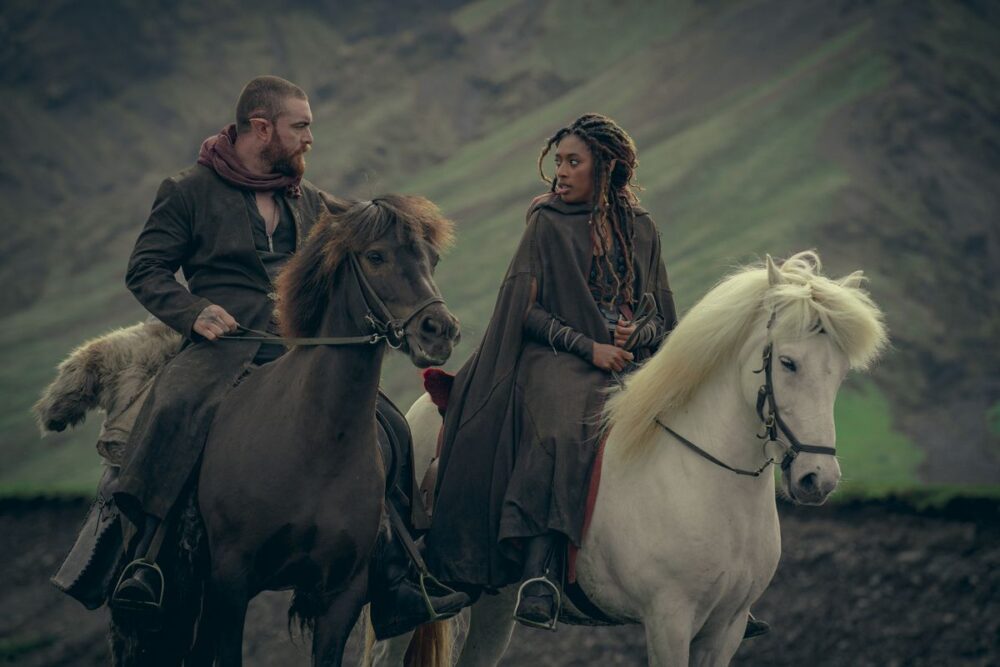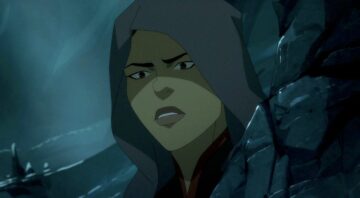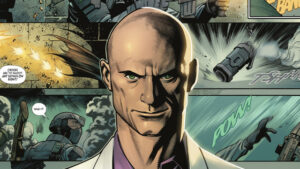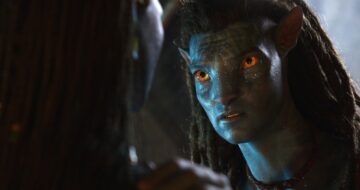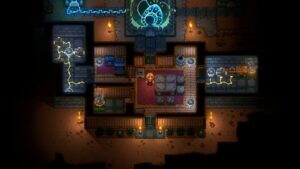Around this time last year, Netflix’s Witcher universe was on a hot streak: Even with some missteps in season 2, the series produced one of its best episodes ever, made smart work of even the franchise’s more twisted reveals, and teed up spinoffs galore. Then last month the news broke: Henry Cavill, the actual Superman who brought gravitas to the role of Geralt, would be replaced by Hunger Games actor Liam Hemsworth.
Still, like so many shows, it seemed possible The Witcher could live on — after all, what was a single actor to a multiverse, especially one with a highly touted prequel just over a month away? But the intense scrutiny makes each new step in the Witcher universe feel heavier (even if there’s already been a first foray outside of the original show with Nightmare of the Wolf, the animated movie about Geralt’s mentor). And unfortunately, The Witcher: Blood Origin is the worst-case scenario: a profoundly messy and unappealing series that casts doubt on the world of The Witcher’s potential in a post-Cavill era.
Set 1,200 years before Geralt and Ciri’s unorthodox father-daughter relationship, Blood Origin covers some of the universe’s most important events, like the creation of the first Witcher and the Conjunction of the Spheres, “when the worlds of elves, men, and monsters merged into one.” For those less invested in Witcher lore, its trailers also promised Michelle Yeoh as a sword master, which should drastically improve the potential of almost any property.
The actual thrust of Blood Origin’s story lies elsewhere, though. Éile (Sophia Brown) is an elite elf warrior from the Raven clan who’s turned her back on her life of fighting in favor of being a wandering bard. But trouble on the Continent pulls her back to the blade, throwing her together with Fjall (Laurence O’Fuarain), a warrior elf from the rival Dog clan. As the two untangle the larger war they’ve stumbled into, they pull together a band of merry adventurers, including Meldof (Francesca Mills), a dwarf with a hammer and a proverbial ax to grind; Brother Death (Huw Novelli), a warrior with a bloodied past; and Yeoh’s Scían, an unrivaled fighter who wants to retrieve a sword sacred to her people. Awaiting them in the capital city is the villainous Chief Sage Balor (Lenny Henry), who seeks more powerful magic to conquer other worlds, and Princess Merwyn (Mirren Mack), an elf ruler desperate to leave the confines of patriarchal monarchy.
Photo: Lilja Jonsdottir/Netflix
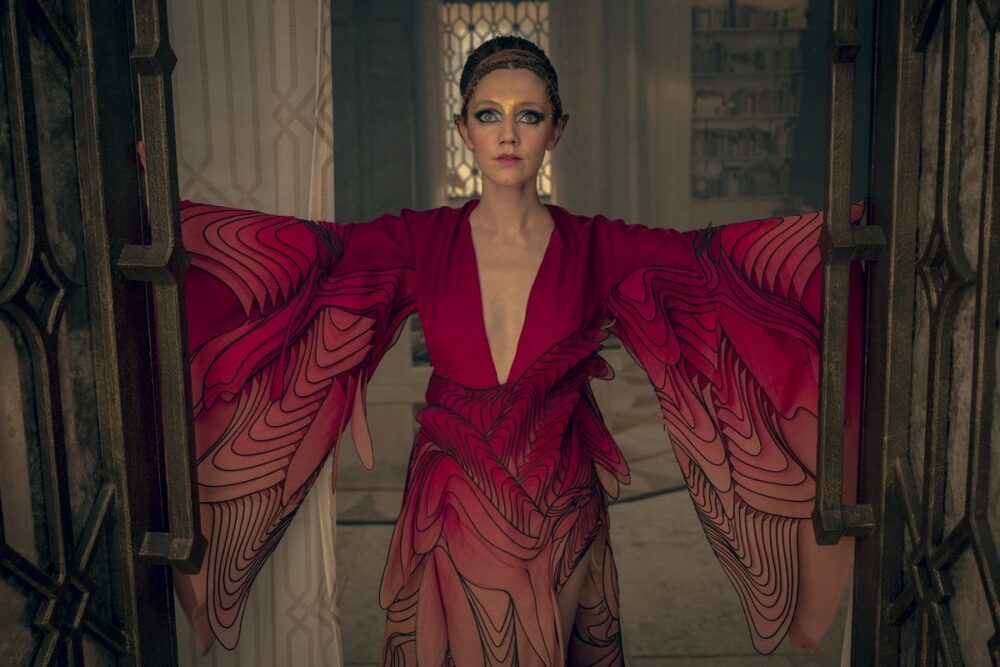
Photo: Susie Allnutt/Netflix
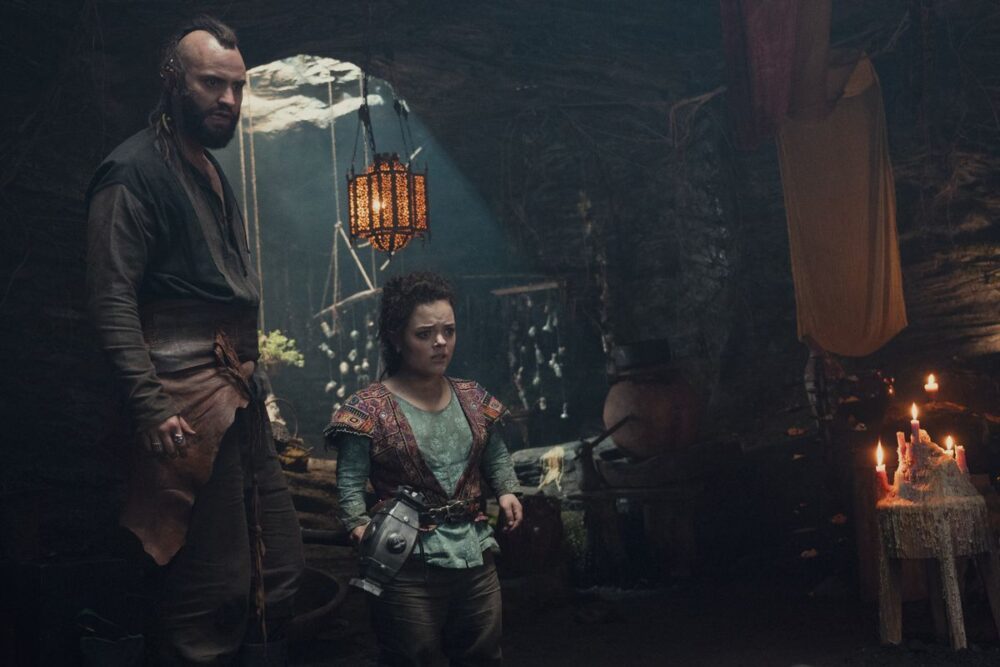
Photo: Susie Allnutt/Netflix
In other words, Blood Origin has a lot going on, especially for just four episodes (an order cut down from the reportedly six that were planned and shot). And yet, Élie and Fjall are the heart of the story, and where its seams start to show, if not fully come apart: As we watch their relationship grow from uneasy allies to comrades in arms, it’s clear the series has no time or care for meaningful stakes or emotions. We don’t know anything about these characters at all, and once backstory gets filled in it feels sloppy and late, so removed from the throughline of their narrative as to reveal how little any of the details actually matter to the show. When someone close to Élie gets threatened or Fjall thinks back to the woman he loves, the sentiment is supposedly vital to their story but also instantly forgotten, leaving no lasting impression on their arc or character at all.
Which is the most shocking thing about Blood Origin. The series is — maybe more than anything I’ve ever seen — profoundly moored in exposition. And yet nothing gets explained or explored; minute facts are tossed off and tossed out with equal, clumsy care. Fjall and Éile’s warrior clans have no distinguishing traits that separate them from each other. There’s a class conflict that keeps getting hinted at through a song Élie is famous for, but there’s never much consideration of what that actually means, in-universe, beyond “lower-class folks are hungrier than their elite counterparts.”
The band of warriors the duo recruits to their cause each come with their own backstory too, but often those seem to exist purely to… tell the audience about, and that’s it. Magical twins Syndril and Zacaré (Zach Wyatt and Lizzie Annis) cry over a tragic event in their past and that’s the extent of its impact. When Élie promises Scían the chance to reclaim the sacred sword of her people, it’s introduced in the conversation with no explanation for how Élie would’ve even known it was gone. Meldorf’s whole quest is satisfied in her first two introductory scenes (and it could’ve been done in just one).
[embedded content]
In a stronger show, these could be fascinating implications of the larger world and the histories we don’t see, or telling details about how insubstantial these conflicts really are, or even just a slight error to hand-wave away. Here they just all feel like clear mismanagement, a sign of how much was confoundingly edited out to muscle the story to its endpoint.
None of this has to be a death sentence for a franchise. The Star Wars prequel series has its defenders, who appreciate the interesting ideas one can unearth in George Lucas’ messy execution. But Blood Origin doesn’t offer the same pleasures, even from a prequel perspective. It indulges so much telling that it forgets to show why the big, Witcher-universe events matter to the story. Most of its revelations are sidelined or edited to the point of tatters, forcing the beats to be explained through a voice-over being told to Jaskier (Joey Batey) in The Witcher’s timeline. The result is that characters can’t make the case for themselves, and the bigger prequel implications never add anything new or substantive about the world we’re supposed to be seeing the origins of.
Worse still, it highlights just how little the audience needs any of this, and how detrimental it can be to too deeply mine the franchise’s nooks and crannies — how thin the universe of The Witcher’s high fantasy can feel when not anchored by some larger intensity. Sure, there’s elves and dwarves and goblins and mages. There are scary monsters that want to eat you, and magical prophecies. In The Witcher we get the sense that our understanding of these things is limited and serves the parts of it we need to know. They’re a smaller piece of a larger, more expansive world, suggesting a richer story if only we had the time to look that way.
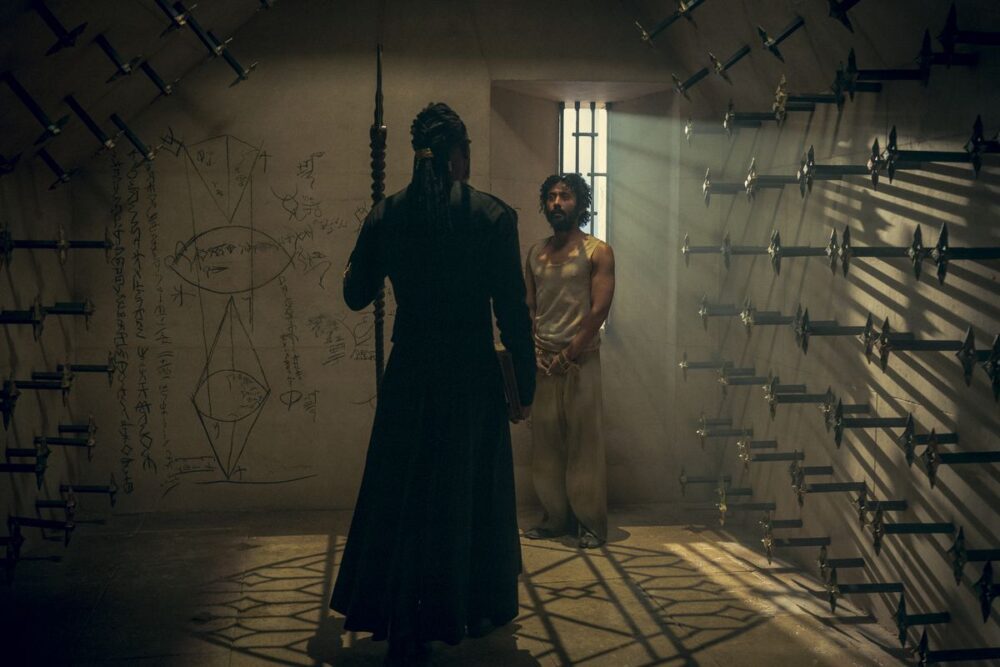
Photo: Susie Allnutt/Netflix
But when Blood Origin’s creators use elves interchangeably with humans, its corner of the universe loses any remaining distinction. What is the difference between an elf and a human in The Witcher — magic? Strength? Ears? Within Blood Origin it seems to be… nothing. And if there’s nothing fundamentally different about these creatures, their world, or their problems, then what does it matter that their sphere gets conjunction-junctioned with that of the main world?
There are deeper answers in the wider Witcher lore, perhaps, but Blood Origin is so interested in being a self-contained story that it seems actively unable to sit next to the other properties. While Nightmare of the Wolf felt a bit insubstantial when held against The Witcher’s consideration of monstrosity or Yennefer’s longing for motherhood, it still coherently wrestles with the deeper conundrums of Witcher lore. And ultimately, it manages to at least provide the window into an important chapter of the history of The Witcher.
Blood Origin, in contrast, seems only capable of having that conversation poorly at best, loosening the rules of the universe to the point of incoherence. In a fantasy world like The Witcher’s, those bounds are what set it apart; we need to know that chaos magic comes at an extreme cost. But nothing in the text of Blood Origin elucidates what makes Balor’s invocation of it different from what he was doing before. While his grander ambitions of conquering other cultures are standard enough, the finer points of his perspective fall by the wayside, flattening his — and everyone else’s — battles.
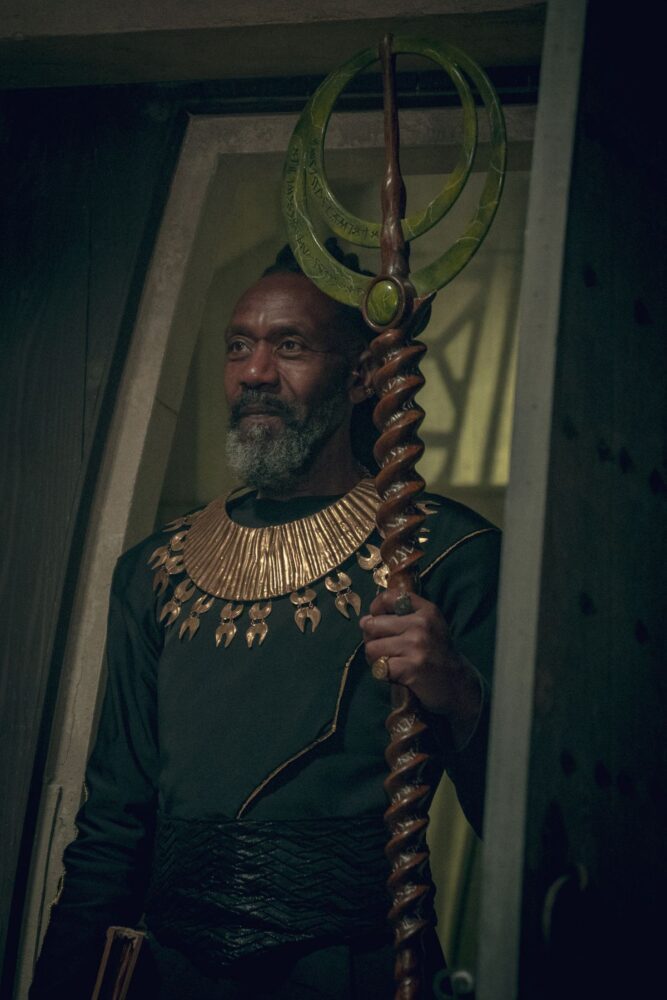
Photo: Susie Allnutt/Netflix
Whatever there is to say about power and who wields it just can’t be considered all that deeply because Blood Origin is so densely packed with meaningless exposition and toothless backstory. There’s clearly grander ambitions there — like the way Merwyn feels trapped in her role — but they can’t amount to much when every scene is tasked with at once introducing and delivering on new motivations. Merwyn is ostensibly a power player, but she never feels like it, because her choices feel flighty at best. And this skittering, incoherent pacing is at the backbone of every story. There’s no time to indulge the calmer, sager moments that define the Witcher universe’s best scenes.
And so the conflicts of Blood Origin become remarkably frictionless, moving dizzyingly and robotically along tracks simply because the story demands it. At best they make the conflict in The Witcher proper look silly, and at worst — well, it makes you doubt there’s much steam in widening this on-screen universe at all (a ridiculous thing to feel about a story that’s propelled decades of books, short stories, and video games!).
Art is by its nature experimental, and experiments can fail. But Blood Origin thuds resoundingly, with each echo of its impact more disconcerting than the last. This show doesn’t have to answer for whether The Witcher can exist without Henry Cavill — but it’s a troubling look at what the universe could be without a steadying presence like his. Cavill isn’t the only thing that makes The Witcher; some of the most interesting stuff in the universe has nothing to do with him at all. But he is a defining feature of it, a constantly committed fanboy who finds such depth in a character that would be so easy to make really boring. As our perspective character, he (or the people who care about him) set the series’ tone, and the poignancy he establishes radiates out into stories he’s not even in.
Blood Origin exists as the opposite of that: a world with no defining fantasy characteristics, a multiverse even Michelle Yeoh can’t rescue. It is a textureless world populated by generic archetypes fighting to get from point A to point B because the plot wills it. The problems are deeper than not having a star to root the world in. The Witcher: Blood Origin ultimately falls victim to the risk any multiverse (and there are many) runs when it too greedily expands, losing what makes it special. Blood Origin has no time for consideration of what makes the Witcher universe unique or meaningful at all, leaving it as just a muddled, reckless attempt to get more Witcher stuff out the door. If there’s hope for The Witcher to survive losing a star and build itself into a bigger universe, it’s going to have to make a better case than this.
